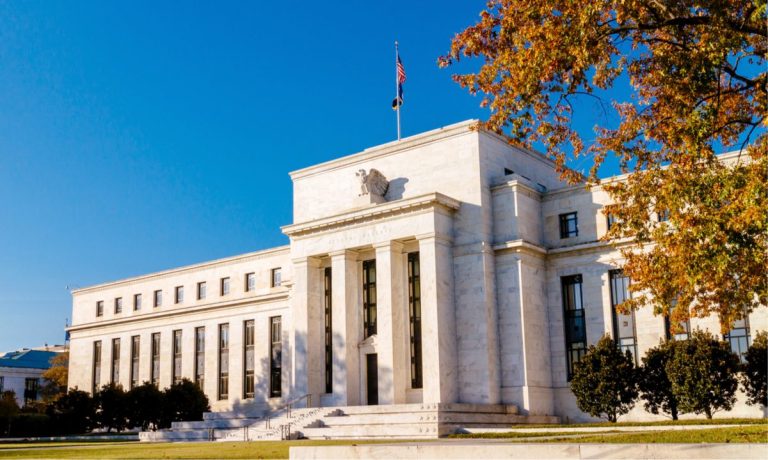Fed Offers Crypto Banks Path to Global Payments Rails

The Federal Reserve has opened a path for crypto banks and stablecoin issuers to gain access to master accounts that would bring access to the global payments system.
On Tuesday (Aug. 16), the Fed’s Board of Governors voted unanimously to create a three-tiered review system that would allow institutions with “novel charters” — such as the Wyoming-issued special purpose depository institution (SPDI) charters crypto bank Custodia and crypto exchange Kraken’s Kraken Bank — to apply for master accounts.
The move means that, if approved, crypto banks and other FinTechs will not need to go through an intermediary bank to access the national and international payments systems that Federal Reserve bank master accounts provide access to.
See also: Fed Master Accounts Give FinTechs Firepower to Meet, and Beat, Banks on Their Own Payments Turf
“The new guidelines provide a consistent and transparent process to evaluate requests for Federal Reserve accounts and access to payment services in order to support a safe, inclusive, and innovative payment system,” Fed Vice Chair Lael Brainard said in a statement.
The board said the guidelines “establish a consistent, comprehensive, and transparent framework for reserve banks to analyze access requests on a case-by-case, risk-focused basis reflecting the institution’s full risk profile (including its business model, size, complexity, and regulatory framework) and to mitigate, to the extent possible, the risks identified.”
FinTechs, including crypto firms and their supporters, have said that without master accounts and direct access to the payments rails, financial innovation would be stymied.
The ruling is also potentially important for stablecoin issuers that have sought banking charters or might be required to under proposals by the President Biden’s working group on crypto that would require all issuers of the dollar-pegged cryptocurrencies to be banks.
It will also give the Fed more authority over crypto banks, which some opponents have said is sorely lacking.
Read more: Sen. Warren Issues Rallying Cry to Counter Crypto’s Influence Over Banks
Extra Scrutiny
While the Fed Board noted that it had received many comments that called for both easier paths and more challenging ones for institutions with novel charters to gain access to master accounts and payments services, it believes its recommendations “establish a consistent, comprehensive, and transparent framework.”
The rules establish three tiers of institutions, whose applications would receive an increasing amount of scrutiny depending on their existing level of regulatory oversight. Tier One institutions with insurance from the Federal Deposit Insurance Corp. (FDIC) would receive “streamlined” scrutiny.
Meanwhile, Tier Two would consist of non-federally insured institutions that are either “subject (by statute) to prudential supervision by a federal banking agency” or holding companies that “would be subject to Federal Reserve oversight (by statute or by commitments).” They would receive an intermediate level of scrutiny.
Tier Three would be the novel-charter institutions that are neither federally insured nor supervised by a federal banking agency. These would get the highest level of scrutiny.
Pushback
While crypto banks have been aggressively pushing for these accounts and a number of Congress members — notably those from Wyoming — have called for master account access for institutions that are not FDIC insured, the banking industry has opposed these changes.
Related: US House Panel Aims to Move Stablecoin Bill by Next Week
The American Bankers Association (ABA) responded to the guidelines by saying that “allowing new financial players to access the Federal Reserve system without requiring them to meet the same high standards as banks poses real risks.”
It cited Reserve Board Governor Michelle Bowman, who called the guidelines a first step and warned “that this publication could set the expectation that reviews will now be completed on an accelerated timeline.”
In June, Custodia sued the Fed for failing to act on its application for a master account within the requisite yearlong timeline.
Calling out Kraken Bank and Custodia in particular, the Bank Policy Institute (BPI) in May argued that FinTechs with “novel charters” like the SPDIs “seek these charters to maximize the scope of activities they are permitted to engage in at the lowest cost, which means skirting to the greatest extent possible the tangible and intangible costs associated with complying with the regulatory and supervisory framework that applies to regular banks.”
As far back as October 2020, the BPI and more than a half-dozen other groups, including The Clearing House and the ABA, opposed granting Kraken access to the payments systems, citing both heightened anti-money laundering (AML) concerns and “risks without appropriate supervision across the breadth of its affiliated entities.”
For all PYMNTS crypto coverage, subscribe to the daily Crypto Newsletter.